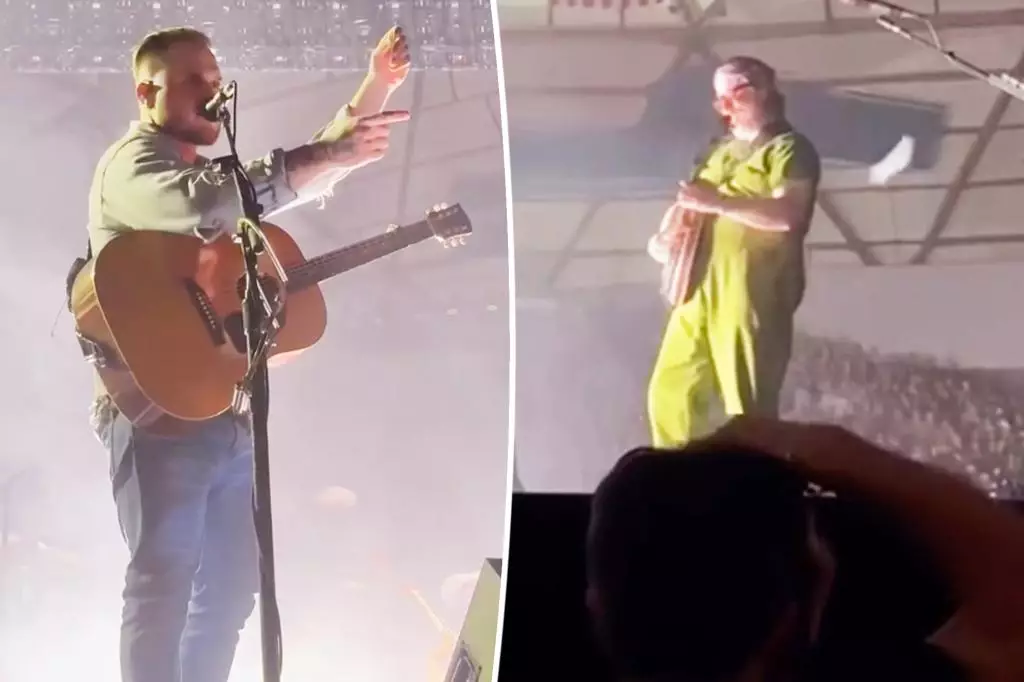Concerts are often a blend of exhilaration, emotion, and a shared connection between artists and fans. However, the dynamics can take a sharp turn when decorum breaks down, as evidenced by an incident during Zach Bryan’s concert at Tacoma Dome in Washington. Recently, a fan threw an object onto the stage, not only disrupting the performance but also introducing a tension that escalated quickly.
The Incident: An Unwelcome Disruption
As Zach Bryan was performing, a flying object struck his fellow guitarist, prompting a swift and pointed response from the artist. The unexpected incident drew immediate attention and highlighted the delicate balance artists must maintain during live shows. Bryan, visibly perturbed, called out to the audience for accountability. His reaction underscores a growing concern in the music industry: the increasing frequency of concert-goers behaving irresponsibly.
Bryan’s exclamation, “Don’t throw s—t at concerts!” reflected a shared frustration that many performers have voiced recently. The artist’s commitment to preserving the integrity of his performances was evident, and he went further by expressing a willingness to identify and remove the fan responsible for the disturbance. This incident raises significant questions about the norms of concert behavior and the responsibilities of fans in ensuring a safe and respectful environment.
Such disruptive behavior is not a standalone incident specific to Bryan. It is part of a broader trend where concert disruptions, often fueled by the alcohol consumption and excitement of the audience, have become commonplace. High-profile incidents include Pink receiving her late mother’s ashes thrown at her and Drake having a vape hurled onto the stage. Each event serves as a sobering reminder of the changing atmosphere at live performances where boundaries of respect seem more easily crossed.
Fans attending concerts should remember that their actions have consequences not just for the artists, but for themselves and other audience members. A momentary thrill derived from throwing an object can lead to serious repercussions, including removal from the venue and the potential for legal action. Live performances thrive on mutual respect; when that is violated, the shared experience becomes tainted.
Adding further complexity to the situation surrounding Zach Bryan’s concert is his recent split from Brianna “Chickenfry” LaPaglia. It was reported that their breakup has not been without its drama, with LaPaglia accusing Bryan of emotional abuse during their relationship. The backdrop of personal turmoil only amplifies the stress of public performances for artists like Bryan. This situation not only highlights the personal struggles musicians often face but also brings to light how their emotions can influence their onstage presence.
In an environment already fraught with emotional highs and lows, such incidents can exacerbate feelings of vulnerability. For Bryan, this disruption may have transformed what should have been a fulfilling concert experience into a source of frustration and disappointment. Moving forward, it will be essential for artists to vocalize their boundaries and promote understanding about unacceptable behaviors at their shows.
The Path Forward: Navigating Concert Etiquette
As the music industry evolves, so too must the standards by which fans engage with artists during live shows. Promoters and venues should consider implementing clearer guidelines regarding audience behavior, perhaps incorporating messages about respect for performers into pre-show announcements. It is crucial that artists create a safe space for expression—both their own and that of their audience.
In response to increasing disturbances at concerts, fans must embrace a collective responsibility to foster a culture of respect. Live music should be a shared celebration, not an arena for reckless behavior. As Zach Bryan continues his “Quittin’ Time” tour, he has a unique opportunity to not only deliver his music but also to champion the importance of maintaining decorum among his followers.
Ultimately, both artists and fans must strive for a harmonious relationship that prioritizes safety and respect at concerts, allowing for the deeply transformative experience that live performances can offer.
